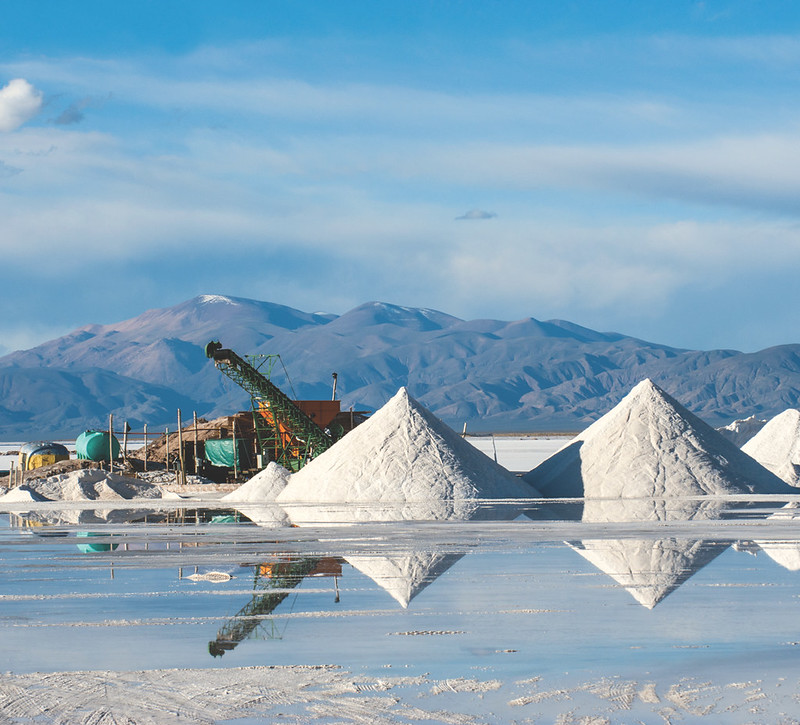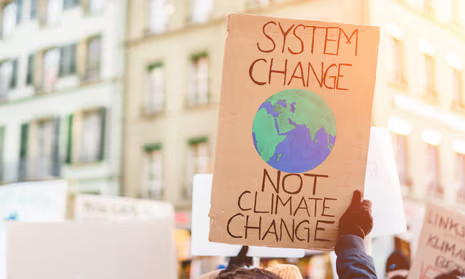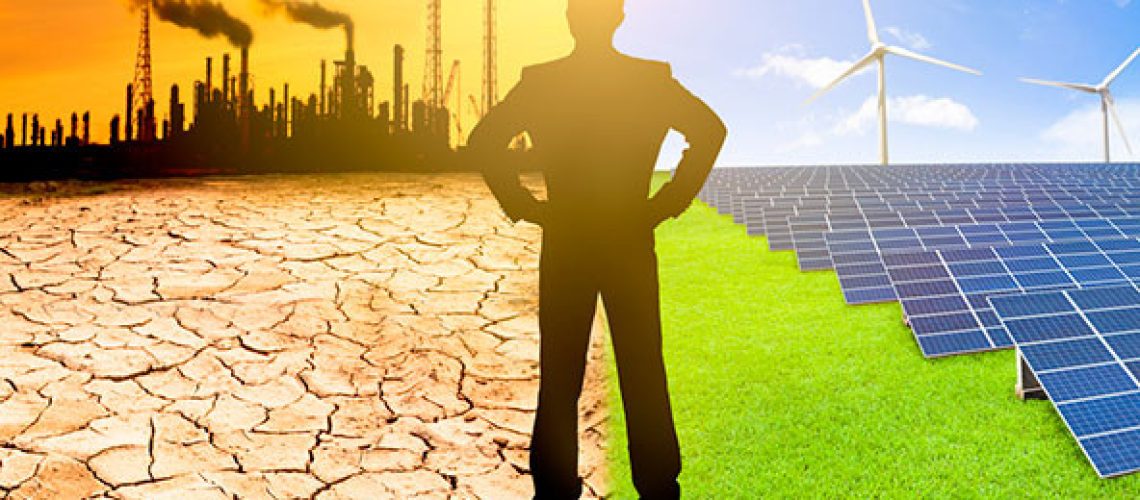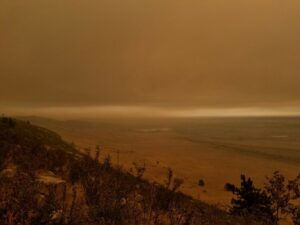Guest Post by Emilia Ravetta, 2023-2024 Sustainability Leadership Fellow, and Ph.D. Candidate in the Department of Sociology at Colorado State University
The 2023 was the warmest year on record of history (World Meteorological Organization 2023). With increasing temperatures, global warming and climate change are only become more concerning and immediate. As a result, transitioning away from carbon-intensive sources of energy is critical to address the climate crisis (Hernandez and Newell 2022). The decarbonization of energy production implies a rapid and expansive development of mining, mainly in peripheral and semi-peripheral countries (aka third world or developing countries) to meet the global demand for minerals. The ongoing global energy transition is sustained by the geographic externalization of labor and natural resources and has increased the pressure on natural resources extraction in Latin America, reproducing the regional position as the world’s raw material supplier (Dorn 2022).
Energy transition is a complex and non-linear process with multiple questions and interdependent factors. Therefore, the study and possible solutions of global energy transition should consider biological and natural processes as well as the socioeconomic and political trade-offs. Social sciences, particularly environmental sociology and environmental justice, provide tools and perspective to broader the understanding of energy transitions and its challenges.

Environmental sociology
A growing sub-field in sociology is environmental sociology. Environmental sociology offers a comprehensive framework for studying the intricate interplay between society and the environment, especially regarding energy transition, food security, and water rights. Departing from traditional sociological perspectives, environmental sociology embraces the “new environmental paradigm (NEP)”, acknowledging the finite nature of the world and the existence of physical and biological constraints on economic growth and social progress. Scholars in this field study environmental issues, allowing for diverse interpretations of their origins, repercussions, and potential remedies.
The field broadens the scope of traditional sociological studies by examining social relations with the built and natural environment, fostering a systemic analysis. For instance, when studying energy transition and mining, environmental sociologists delve social and environmental relationships exploring consequences on ecosystems and living species. Additionally, environmental sociology contributes to the understanding of environmental issues in the natural sciences by scrutinizing the socioeconomic structures underlying physical or biological challenges.
Environmental sociology envisions a holistic analysis of global processes, emphasizing socioecological sustainability and requires a knowledge of natural science. By bridging sociological and natural science perspectives, environmental sociology aims to unravel the complex causes and consequences of environmental challenges, striving for comprehensive and interdisciplinary solutions to complex issues.
Environmental justice
Environmental sociologists collaborate with environmental justice activists to understand and tackle the complex relationships between humanity and the natural world. This collaboration often involves providing research and resources to support community and activist’s claims within social movements. Integrating environmental justice perspectives with academic research creates a powerful framework. The environmental justice movement seeks to address global injustices focusing on socioeconomic and political decisions about the nonhuman world that affects the environment and humanity unequally. Thus, the connections between environmental justice and environmental sociology provides valuable tools for scrutinizing Latin America’s green extractivism in the energy transition, examining reasons for resource extraction, benefits, promoted growth types, and social and environmental consequences for local communities.
Environmental justice involves distributive, procedural, recognition, and restoration justices. Distributive justice focuses on the equitable allocation of environmental “bads” and “goods”, such as pollutants and clean resources. Procedural justice examines exclusions from decision-making processes regarding resource use, while recognition justice addresses the repeated marginalization of certain groups and emphasizes transparent information and acknowledging non-human entities. In the context of a transition to low-carbon energy, procedural and recognition justice become vital for integrating social and ecological perspectives, ensuring diverse participation, and considering various species in decision-making. Restoration justice aims at rectifying historical and ongoing injustices. Understanding and addressing these dimensions of environmental justice is crucial for guiding an equitable and sustainable energy transition in Latin America. Particularly, by considering the region’s history of extractivism and colonialism and to prevent perpetuating past injustices.

Conclusions
Incorporating ideas and perspectives from environmental justice movements, environmental sociology scholars identify as scholars-activist. They seek to merge theoretical and interdisciplinary scientific tools and knowledge of social sciences, with the knowledge and experiences of communities and social movements to push for equitable social change.
As shown in this example, environmental sociology and environmental justice approaches can broaden the analysis of ecological process, particularly by illuminating and contemplating social and economic tradeoffs that need to be consider in future decisions. Environmental sociology is a clear example of a discipline that learns and collaborates not only interdisciplinary with other disciplines, but with social movements and affected communities to arrive to comprehensive understandings and equitable solutions to wicked problems.
References:
https://climatepromise.undp.org/news-and-stories/what-just-transition-and-why-it-important
Agyeman, J., Schlosberg, D., Craven, L., & Matthews, C. (2016). Trends and directions in environmental justice: from inequity to everyday life, community, and just sustainabilities. Annual Review of Environment and Resources, 41, 321-340.
Burrow, S. (2017). Foreword: The Imperative of a Just Transition. Just Transition: A Report for the OECD, Just Transition Centre, ITUC, Brussels, Belgium, 1-2.
Catton Jr, W. R., & Dunlap, R. E. (1978). Environmental sociology: A new paradigm. The american sociologist, 41-49.
Dorn, F. M. (2022). Green colonialism in Latin America? Towards a new research agenda for the global energy transition. European Review of Latin American and Caribbean Studies/Revista Europea de Estudios Latinoamericanos y Del Caribe, (114), 137-146.
Hans-Jürgen Burchardt. 2023 “Raw Materials and Society in Latin America”. Revista Foro, https://www.revistaforo.com/2023/0706-04-EN
Hernandez, D. S., & Newell, P. (2023). Oro blanco: assembling extractivism in the lithium triangle. In Climate Change and Critical Agrarian Studies (pp. 248-271). Routledge.
Lockie, S. (2015). What is environmental sociology?. Environmental Sociology, 1(3), 139-142.
Mohai, P., Pellow, D., & Roberts, J. T. (2009). Environmental justice. Annual review of environment and resources, 34, 405-430.
Newell, P., & Mulvaney, D. (2013). The political economy of the ‘just transition’. The geographical journal, 179(2), 132-140
Ruth DeFries, Harini Nagendra. 2017. Ecosystem management as a wicked problem.Science 356,265-270. DOI:10.1126/science.aal1950
Winkler, H. (2020). Towards a theory of just transition: A neo-Gramscian understanding of how to shift development pathways to zero poverty and zero carbon. Energy research & social science, 70, 101789.)
World Meteorological Organization. 2023. “Provisional State of the Global Climate in 2023” https://wmo.int/publication-series/provisional-state-of-global-climate-2023






